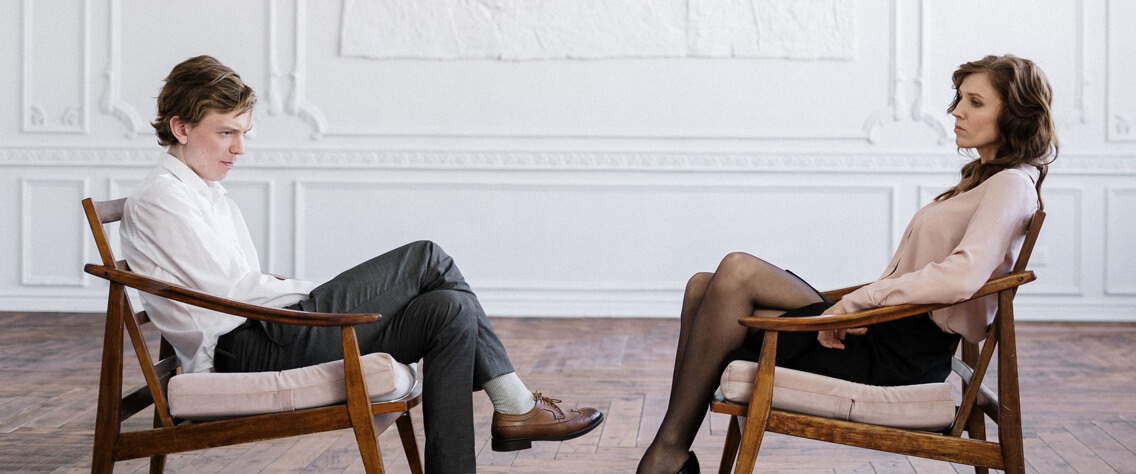How Do I Find a Couples Counselor Near Me?
 Couples Therapy in Greater Philadelphia
Couples Therapy in Greater Philadelphia
Are you and your partner facing relationship challenges and seeking couples therapy or marriage counseling in the Philadelphia area? Finding a highly trained relationship specialist can be a game-changer for your relationship.
Whether you are dealing with communication issues, intimacy problems, or trust issues, a skilled couples therapy can provide guidance, tools, and support to help you navigate these challenges.
We currently have availability with Gottman trained couples therapists whether you want to meet in person or via tele-health.
Take Me to the Scheduling Page
Discover the Power of Healing and Connection with a Couples Therapy Therapist
Are you and your partner struggling to connect and communicate effectively?
Do you find yourselves caught in repetitive patterns of conflict and distance?
Do you live in Pennsylvania? (Philadelphia, Harrisburg, Pittsburgh?)
It’s time to discover the power of healing and connection through the guidance of a couples therapy therapist.
Not sure if you need couples therapy? Take this quiz to find out.
Couples therapy is a transformative process that allows partners to explore their individual needs, desires, and patterns within the relationship. With the support of a licensed therapist, couples can learn healthier ways to communicate, resolve conflicts, and deepen their emotional bonds.
What is Couples Therapy?
Couples therapy, also known as marriage counseling or couples counseling, is a specialized form of therapy that focuses on helping couples improve their relationship. It provides a structured and safe environment for partners to address their concerns, explore their emotions, and work towards resolving conflicts.
Couples therapy is based on the premise that relationship problems are often rooted in the dynamics between partners. It aims to identify and address the underlying issues that contribute to relationship distress, such as poor communication, unresolved conflicts, and unhealthy patterns of interaction.
During couples therapy sessions, the therapist facilitates open and honest communication between partners, helping them gain a deeper understanding of each other’s perspectives and needs. The therapist also teaches essential skills and guides couples in speaking to each other with kindness, empathy and vulnerability.
Finding the Right Couples Therapist Near Me
It has become almost impossible to find an experienced couples therapist in the Philadelphia area.
Finding the right couples therapy therapist is essential for a successful and transformative therapeutic experience.
Here are some factors to consider when selecting a couples therapy therapist:
1. Qualifications and experience
Look for a therapist who has specific advanced training in an evidence-based approach. Check their credentials and certifications to ensure they have the necessary qualifications to provide effective therapy. Don’t be afraid to ask how many years of experience they have.
2. Approach and philosophy
Different therapists have different approaches and philosophies when it comes to couples therapy. Some may focus on cognitive-behavioral techniques, while others may emphasize emotion-focused therapy or action-oriented approaches. Research different approaches and find a therapist whose philosophy aligns with your goals and preferences.
3. Compatibility and rapport
Establishing a good rapport with your therapist is crucial for a productive therapeutic relationship. Schedule an initial consultation or phone call to get a sense of the therapist’s style, personality, and communication approach. Trust your instincts and choose a therapist with whom you feel comfortable opening up and sharing your concerns.
4. Accessibility and availability
Consider the logistics of attending therapy sessions, such as the therapist’s location, availability, and scheduling options. Find a therapist who can accommodate your needs and preferences to ensure regular and consistent attendance.
5. Cost and insurance coverage
Couples therapy can be a significant financial investment. Inquire about the therapist’s fees and whether they accept insurance or offer sliding-scale fees based on income. It’s essential to consider the financial aspect of therapy and find a therapist whose services align with your budget.
What to Expect in Your First Three Couples Therapy Sessions
The first couples therapy session is an opportunity for the therapist to gather information about the couple’s concerns, goals, and history.
It is also a chance for the couple to get to know the therapist and ask any questions they may have about the therapeutic process.
At Main Line Counseling Partners, we use the Gottman Method of Couples Therapy which has a comprehensive intake process.
Session 1: Intake
During the first session, which is 80 minutes long, the therapist will start by asking questions about their goals and why the couple is seeking help. Then they will ask the couple to recount the moment they first met, and then share the history of what their relationship has been like so far, including challenges, successes and major transitions.
One unique aspect of a Gottman intake is the conflcit conversation. At the end of the first session couples will be asked to talk about something they disagree about in front of their couples therapist. This allows the clinician to observe how they manage conflict.
Session 2: Individual Meetings
After the initial session, the therapist meets with each person individually to get a personal history. NOTE: Gottman therapists use a transparency policy and do not keep secrets. The individual sessions are not to talk about the other partner, they are to gain insight into each partner’s lives, challenges and strengths.
Session 3: Feedback Session
At the third session, the Gottman-trained couples therapy therapist reviews the results of the assessment and comes up with a plan together with the couple.
The main reason the Gottman Method has been so successful in helping couples find happiness is that it is a structured action-oriented approach that focuses on strengths, emotional vulnerability and positive change.
Philadelphia Based Gottman Therapists with Current Availability
We are now seeing couples therapy clients both in person at our offices in Bryn Mawr, Villanova and online (if you live in Pennsylvania). The following clinicians have current availability.
- Teresa Thompson, LPC, Level 3 Gottman Therapist (Available for both traditional and intensive sessions)
- Christina Bair, LCSW, Level 1 Gottman trained
- Brian Matlaga, MS, Level 1 Gottman trained
- Dr. Michael Silverstein, Ph.D. Level 3 Gottman Therapist (Available for intensive sessions and couples retreats in the Poconos)
- Laura Silverstein, LCSW, Certified Gottman Therapist (Available for couples retreats in the Poconos and online learning)
Other Ways We can Help
If you don’t live in Pennsylvania, or near Philadelphia, we have many other products and services ranging from free worksheets, eBooks and courses, to budget friendly couples retreats (online and in the Pocono Mountains).
Here is a quiz for you. Answer eight questions and you’ll get a personalized recommendation of the program or products specifically tailored to the results of the quiz:
Are You Lonely or Fighting Too much?
Many people in committed relationships feel disconnected from their partners. Even the very people you love the most can sometimes cause you to feel unappreciated or like you are not a priority in their life.
Couples therapy with a Gottman-trained therapist is worth considering sooner than later when the warning signs present themselves.
You can start now by scheduling an appoitnment with our intake coordinator to find a couples therapist who is a good fit for you and your partner.
Take Me to the Scheduling Page
Healthy Communication in Romantic Relationships
Sometimes couples find themselves having the same arguments over and over again and they are unable to stop fighting, even about things that seem irrelevant. In other cases distance may grow between two people until they feel like they are living separate lives.
Relationships take effort; there are no shortcuts. When a partnership is healthy and functioning well, it nourishes us, providing comfort and support. We long for someone to celebrate the good times, lean on through the bad times, and challenge us to be our best selves.
When a relationship goes awry and it isn’t functioning, there are ways to get b ack on track.
ack on track.
How can Gottman-Trained Couples Therapy Help?
With one in two marriages ending in divorce, it is unfortunate that the average couple waits six years from the onset of problems to seek couples therapy or marriage counseling.
There is much misinformation about love. Many believe that a happy marriage is a matter of luck, or that an argument is a sign of trouble. When “happily ever after” doesn’t come true as it does in fairy tales, some couples may think that their relationship is fatally flawed.
Thankfully, leading relationship researchers have turned marital success into a science. Having observed real couples in their everyday lives, not just in therapy sessions, psychologists such as John and Julie Gottman have gathered data about the approaches and strategies that will make a reliable difference in relationship satisfaction. This new research has equipped marriage counselors with tested and proven tools to help couples maintain loving, flirtatious, long-term commitments.
You Deserve to Feel Loved
Fighting doesn’t tell the whole story.
New research on marital satisfaction has demonstrated that fighting is usually not the biggest problem in a relationship. Instead, researchers study attachment and the physiological effects that connection and disconnection have on humans. Simply put, distance from a loved one causes physical and emotional distress.
Humans are mammals, born helpless and wired to form attachments.
Think of a baby who has been left alone in a room. The baby becomes hungry or lonely and looks around for a parent to provide nourishment and comfort. When the baby cannot see her parent, she becomes distressed and cries. If her parents always respond to her cries in a timely manner, the baby isn’t damaged by those brief moments of panic before her caregiver arrives. But if the baby’s needs aren’t consistently met, she will feel disconnected from her caregiver and find herself in a near-constant state of distress, not trusting the people she relies on to keep her safe and meet her needs.
The same attachment dynamic plays out in adult romantic relationships.
In a solid marriage, in which both partners experience frequent moments of connection and trust each other to meet their needs, occasional fighting isn’t a sign of trouble. It’s when two people become disconnected from each other that real trouble arises. Couples begin to view each other as the “bad guy” and become trapped in a negative pattern in which criticism generates defensiveness and the harder one partner pushes, the further the other partner backs up.
Now there is distance between the couple. It becomes increasingly difficult to be vulnerable with each other, and trust begins to erode. The inability to connect leads to real alarm as well as physical symptoms such as a raised heart rate, increased adrenaline, and other “fight or flight” responses. Couples therapy will help you prevent this, but at any time if you are feeling flooded, take the time to slow down and do this 7 Minute Progressive Muscle Relaxation Exercise.
The Role of the Couples Therapist
Couples therapy offers numerous benefits for individuals and relationships. Here are some key advantages of seeking couples therapy:
1. Improved communication: Couples therapy teaches effective communication skills, enabling partners to express themselves more openly and listen actively to each other.
2. Conflict management: Therapists help couples develop healthy conflict resolution strategies, minimizing destructive patterns and finding mutually satisfying resolutions.
3. Strengthened emotional connection: Couples therapy fosters emotional intimacy and strengthens the bond between partners, helping them feel more connected and supported.
4. Enhanced problem-solving skills: Therapy equips couples with problem-solving techniques that promote collaboration and cooperation, allowing them to tackle challenges more effectively.
5. Increased self-awareness: Couples therapy encourages self-reflection and personal growth, helping individuals understand their own patterns, triggers, and contributions to relationship dynamics.
6. Rebuilding trust: For couples facing trust issues, therapy provides a platform for open and honest dialogue, helping partners rebuild trust and create a foundation for future growth.
7. Strengthened commitment: Couples therapy can help partners reaffirm their commitment to the relationship, fostering a sense of dedication and long-term perspective.
8. Prevention of future issues: Even couples in relatively healthy relationships can benefit from therapy as a preventive measure. Therapy helps address minor issues before they escalate into significant challenges.
“My partner is the one who really needs to change! I’m the only one working to try to make this better!”
All long-term relationships require compromise and other efforts from both partners in order to stay strong and connected. The first step to feeling better about your relationship is to shift your focus from what your partner is doing wrong to what you could be doing better. It is also important to remember that love is not a magical potion that is either there or not there. It is a living system that needs daily nurturing and care in order to grow and stay alive.
Getting married isn’t just about finding a soul mate, it’s about finding someone to love, care for, and share a life with. Couples therapy can be a place to re-capture the things that brought you and your partner together in the first place.
Therapy is More than Communication Skills
Communication skills are a necessary but insufficient condition for a strong relationship. Couples therapists will help you and your partner discuss issues in a kind and respectful manner so that you can focus on the positive aspects of your friendship and intimacy.
In couples therapy, the couple learns to step back and observe negative patterns that have developed between them. Once they can see the dynamic of criticism/defensiveness and attack/retreat that they have been locked in, they can learn to break this pattern. With the help of their therapist, couples practice stepping out of disconnection and reaching for one another to soothe and comfort.
Instead of seeing their partner as the enemy, they see that their partner is hurting just like they are. Couples discover the physiological effect they have on each other and learn how to generate pleasurable feelings of comfort and support instead of distressing feelings of isolation and danger.
The Gottman Method of couples therapy provides a roadmap to follow to reach this desired connection. It is a very structured approach in which the therapist sits by your side, coaching you to find more productive ways to be together. Please click here to learn what to expect during the assessment, feedback and intervention phases of the work.
The Benefits of Couples Therapy
Finding the best couples therapist in the Philadelphia area can be a transformative step towards overcoming relationship challenges and building a stronger, healthier partnership. By understanding your unique needs, seeking recommendations, and considering important factors during the selection process, you can find a therapist who aligns with your goals and values.
Remember that couples therapy is a collaborative effort, requiring commitment, openness, and active participation from both partners. With the guidance and support of a skilled therapist, you can navigate relationship challenges, improve communication, and foster a more fulfilling and satisfying connection with your partner.
Take the first step towards a happier, more fulfilling relationship by finding a Gottman-trained couples therapist at Main Line Counseling Partners. Our therapists are trained in evidence-based approaches to relationship counseling, ensuring that you receive the highest quality care and support. Start your journey towards a thriving relationship today.
Trust the experts with your most important relationship.
If you live near Philadelphia and are looking for a couples therapist. We are here to help.
Schedule a phone consult with our intake coordinator to set up a free consultation with a couples therapist who is a good fit for your specific needs and has current availability.
Talk to the Intake Coordinator Now

